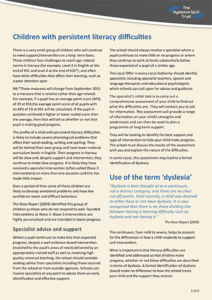use-of-the-term-dyslexia
Use of the Term ‘Dyslexia’ |
FAQ’s |
Use of the term ‘dyslexia’
“Dyslexia is best thought of as a continuum,
not a distinct category, and there are no clear cut-off points. Until recently, a child was deemed to either have or not have dyslexia. It is now recognised that there is no sharp dividing line between having a learning difficulty such as dyslexia and not having it.”The Rose Report (2009)
The continuum, from mild to severe, helps to account for the differences in how a child responds to support and intervention.
What is important is that literacy difficulties are identified and addressed so that children make progress, whether or not these difficulties are described in terms of dyslexia. A formal identification of dyslexia should make no difference to how the school treats your child and the support they receive.
The development of the programme of support and intervention will include the specialist teacher and school staff. As the parent/carer you will be asked for your views. Your child should also be included in the process; older children often have particular views that need to be incorporated. It is likely the school will suggest ways in which you as the parent/carer can support your child at home.
The programme will require all teachers involved with your child to be aware of his/her needs and to make adjustments to their teaching where necessary. As your child goes through school, the programme of support will change and there will be the need to incorporate independent study skills and strategies for later life.
The school should be checking your child’s progress regularly and sharing this information with you. The school’s processes for informing you and for taking you and your child’s views into account should be outlined in the SEND information which must be published on their website (SEND regulations 2014).
The key factor is that your child is making progress in literacy and can manage the literacy demands of the curriculum. Good progress by your child may result in a decrease of support and this should be seen as a positive step.
Additionally, the school should be carrying out regular evaluations and reviews of the programme to ensure that it still meets your child’s needs and that progress
is maintained. Where there are issues, there should
be adjustments so the programme refocuses on your child’s needs. Even though your child may be receiving an intervention from a specialist teacher it is still the class teacher who remains responsible for ensuring that your child is able to make progress in the mainstream lessons.
All teachers should be supported to develop their skills so that they can make any adjustments necessary to their teaching.
“Teachers are responsible and accountable for the progress and development of the pupils in their class, including where pupils access support from teaching assistants or specialist staff”
Code of Practice 6.36
What article would you like to read?
4. Children with Persistent Literacy Difficulties
6. Roles of the specialist Teacher

